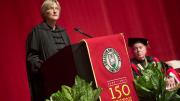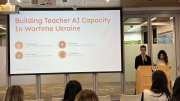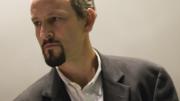Harvard President Drew Faust, speaking at Robsham Theater at Boston College and receiving that institution’s Sesquicentennial Medal, used the occasion to make some of her most expansive remarks on the role and potential of higher education since her own installation address in Tercentenary Theatre nearly five years ago. Her remarks, following her welcome to MIT’s new president, L. Rafael Reif, at his inauguration in September, come at an interesting time for higher education not only in Boston (MIT is a little more than 150 years old itself), but also throughout the United States. This year marks the sesquicentennial of the Morrill Land-Grant Act, which did so much to create public higher education, and today the Supreme Court heard oral arguments in Fisher v. University of Texas at Austin, the latest high-stakes litigation concerning admissions, diversity, and—more broadly—the social meaning of access to higher education in contemporary America.
Updated October 11, 2012, 12:30 p.m. President Faust's text is now available here.
To “Build Value into Our Common Life”
Faust, an historian, referred to Harvard president Nathan Pusey’s participation in BC’s centennial. He was concerned, she said, that society depends on universities “not merely to create economic value, but as [he] put it, to ‘build value into our common life.’” Making sure that the latter is indeed recognized and valued, in light of current economic circumstances, is no mean feat. Faust noted that this is a world “where the measure of things so often trumps the meaning of things, and the practical, immediate uses of knowledge so often overshadow the larger, more enduring purposes of education,” and so seized the opportunity BC offered “to speak about those larger purposes, and the vital role that universities play in defining aspirations and possibilities for the long term.”
She has no doubt thought about those issues during the early years of her own presidency, begun during a robust economic period, followed by a frightening financial crisis and wrenching recession—and the adjustments that entailed in households and institutions alike. It has also been a time of adapting the University to new demands and opportunities, like those represented by the rising potential for applied science and engineering, and for technologically enabled new enterprises—witness the fledgling iLab and the president's innovation challenge grants to encourage incipient entrepreneurs in a variety of fields.
Faust took note of the founding of MIT and BC, of the Morrill Act, and of the subsequent burst of creativity that led to the founding of Johns Hopkins University, in 1876, as a graduate and professional school—and Harvard president Charles William Eliot’s remaking of his institution on the German model of the research university, one freed from the classics and required courses and freed for the scholarly pursuit of electives and of rationalistic learning. She summarized the classical devotion to moral education, and the new era's seeming polar opposite: “For many aspiring and idealistic scholars in this era, the spiritual came to lodge in their search for knowledge for its own sake, knowledge apart from its instrumental or practical uses. Especially in what was widely seen as an increasingly materialistic age,” she said, “the affirmation of the transcendent purposes of learning came to seem imperative.” And yet, there remained the overriding question of “how did knowledge, pursued either for its immediate utility or for its own sake, relate to the living of a life?”
A Battle “Whose Fierceness Would Have Done the Beanpot Proud”
Those opposing views, she said, played out in an argument between BC and Harvard in the last decade of the nineteenth century, “a battle of words whose fierceness would have done the Beanpot rivalry proud.”
Faust then summarized the focus “not just on what higher learning is for, but who it is for,” and the long, gradual opening of doors to diverse students of all backgrounds, circumstances, ethnicities, and genders. In this context, with wide recognition that “Education has long been a critical avenue to full participation in our society—the primary driver of social mobility and of the well-being and prosperity of individuals and nations,” today more than ever, the question again arises, “[W]hat is education for?” She framed the challenge this way:
The instrumental necessity for higher education—the hope it offers so many for a materially better life, for social mobility and prosperity—is compelling, especially in a time of economic uncertainty. This is a case that is easy to make; the promise of jobs and economic growth has widespread appeal. But we must not let the clarity and measurability of the economic case for higher education lead us to abandon the more difficult work of explaining—and embracing—higher education’s broader purposes. By focusing on education exclusively as an engine of material prosperity, we risk distorting and even undermining all a university should and must be. We cannot let our need to make a living overwhelm our aspiration to lead a life worth living. We must not lose sight of what President Kennedy, speaking at the Boston College centennial, referred to as “the work of the university…the habit of open concern for truth in all its forms.”
The risk, she continued, is:
In the rush to apply knowledge to the world’s problems, we lose sight of fundamental questions. We devalue the kinds of inquiry that slowly build the humane perspective—the critical eye, curiosity and skepticism, the habits of the restless mind that yield our deepest understandings. In our need to know the facts, indeed, bombarded by facts, we forget the fact that we are all interpreters, who need not just information, but meaning. In focusing narrowly on the present, we cut ourselves off from the past and the future, blinded to the long view that has always been the special realm of higher learning. How can we create minds capable of innovation if they cannot imagine a world different than the one we inhabit? How can institutions fixated on utility nurture the open spirit of the liberal arts, especially those fields, the arts and the humanities, devoted to questions of interpretation and meaning? How are we to regard the 20 percent decline in humanities concentrators—majors—at Harvard in the past decade in the context of the urgent need for these disciplines in a twenty-first-century world? Think of the constant re-assessment of facts required by the field of law, or the scholarly re-imagining of Lucretius or Shakespeare, made new for each generation, or the implications of new science and technology for how we understand what it means to be human?
Scholarship, she said, “not only requires empathy, it teaches empathy”—points she made by drawing on J.K. Rowling’s 2008 Harvard Commencement address and her own work as a Civil War historian, reading letters written by soldiers 150 years ago. Those kinds of human inquiry and understanding, Faust continued, “exist in the domain of slow and painstaking research, of the free and unfettered search for understanding. Without such scholarship, without zones of contemplation, with only prescribed purposes or goals, we will underemphasize the questions that most concern us, our lives, our mysteries. We will gradually amputate that process….”
“Learning Has No End”
Curiosity-driven inquiry, she said, is fundamental not only to humanistic liberal arts, but also to basic scientific thought—the sort of work that led to discoveries such as the cosmic background radiation left over from the Big Bang, and to Alexander Fleming’s chance finding of penicillin.
“At their best,” Faust continued
universities maintain a creative tension, tackling the purposeful and the apparently pointless with equal delight—from the eating habits of the vampire squid to the nature of empire, to the technology for optimal vaccine delivery. We must continue to foster that creative tension. We must value it and nurture it, and assure its place in the structures and modes of academic inquiry and in our understanding of the university’s fundamental purposes. Because sometimes the best path to short-term goals is through the unplanned byways of the long-term perspective. We need both. We must remember in this age of “outcomes” and measured “impact” that the means and processes of learning and of intellectual exploration have importance in themselves.
The Argentine writer Jorge Luis Borges once said, “We do not read to discover the end….Reading is felicity.” We like results. We appreciate answers. But to paraphrase Borges, we do not learn in order to discover the end. Learning has no end. We perhaps learn most when we come ultimately not to an answer, but to a better question.
For this work, society requires a unique institution:
Universities are a set of institutions unlike any others in our society. Certainly our budgets must balance, our operations must be efficient, but we are not about the bottom line, not about just the next quarter, not even about who our graduates are the day they leave our walls. Our task is to illuminate the past and shape the future, to define human aspirations for the long term. How can we look past the immediate and the useful, beyond what I have called the “myopic present,” to address the larger conundrum of How shall we best live? Who do I want to be today—and tomorrow? To discover not only the ways in which human civilization plans to get somewhere, but to ask the question, Where does it—and should it—hope to go?
In that spirit, she saluted Boston College for its 150 years of “singular achievement,” on an occasion meant to “honor the Jesuit commitment to scholarship, justice, and service.”









